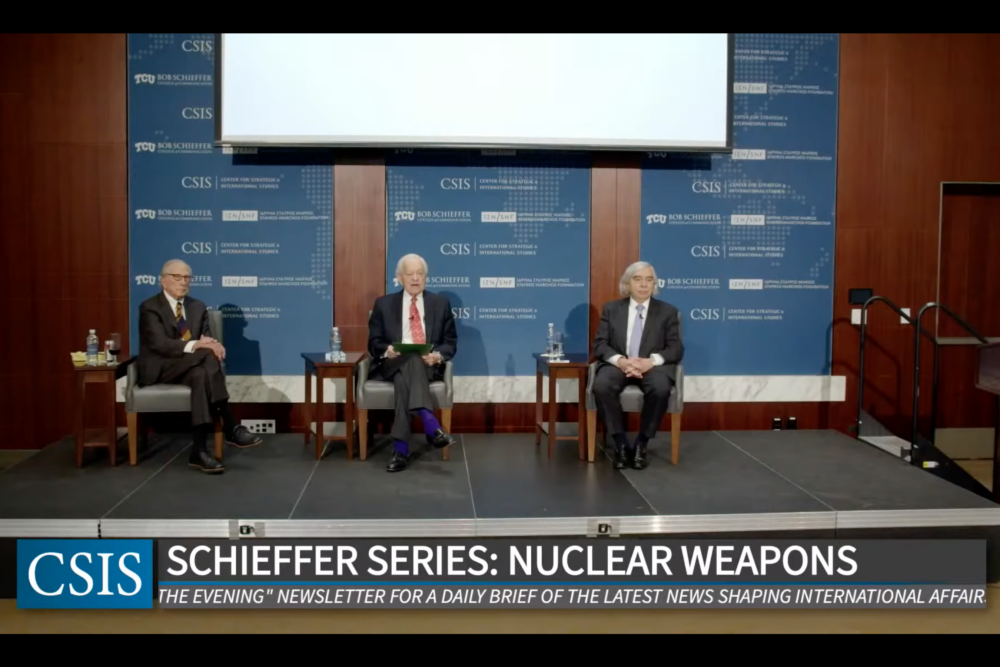Atomic Pulse
Nunn and Moniz Discuss a Host of Security Issues on the CSIS “Schieffer Series”

This post was written by Jack Thuon, an intern with NTI’s Communications Team from September-December 2021. Originally from just south of Atlanta, he is a graduate of American University with a degree in political science and journalism.
NTI Co-Chairs Ernest J. Moniz and Sam Nunn recently joined veteran journalist Bob Schieffer to discuss a range of issues – from Russia, China, and Iran to how political divisiveness impacts national security. The discussion, held on December 8, was part of the Center for Strategic and International Studies’ Schieffer Series and included a discussion of how NTI has contributed to global security over the last 20 years.
Russian Military Build-Up on Ukrainian Border
With the virtual call between Presidents Biden and Putin held the day before, Schieffer opened by asking for a read-out of the meeting. Nunn, a former Democratic senator from Georgia and former Chair of the Senate Armed Services Committee, described recent Russian troop deployments at the Ukrainian border as “very dangerous” but said it was positive that the two leaders met: “Any time that U.S. and Russian leaders talk about strategic matters and talk about dangers, possible confrontations like over Ukraine, I think it’s a positive thing for the world.”
Iran Nuclear Deal
Schieffer asked Moniz, who played a significant role in negotiating the 2015 Iran nuclear deal, the status of the current negotiations. Moniz said the U.S. still has “high confidence” that Iran does not possess a nuclear weapon, but the U.S. pulling out of JCPOA under the Trump Administration has moved it much closer. Iran could now have the materials necessary to construct a nuclear weapon “probably within weeks,” according to Moniz. He stressed that “there are other issues which would make it impractical to have a weapon in three weeks”
due to other factors involved in making a bomb, but that Iran is far closer than it once was.
Need for a Nuclear Fail-Safe Review
Schieffer asked the two leaders to expand on their recent joint op-ed in the Washington Post calling on President Biden to strengthen “the safeguards that could prevent unauthorized, inadvertent or mistaken use of a nuclear weapon, including through false warning of an attack, and challenge other nuclear powers to conduct their own internal reviews.”
Nunn explained how with cyber and new technologies, the “chances of a war by blunder or mistake have gone up … very significantly, and we don’t have any red lines. It’s the Wild West on cyber.”
“It’s a different world from the world in which the last fail-safe review was made,” Moniz said referring to the comprehensive review of U.S. nuclear command and control systems conducted almost 30 years ago during the George H.W. Bush administration.
U.S.-China Dialogue Needed on Nuclear Threat
During a discussion about China’s recent hypersonic missile launch, Schieffer asked if the U.S. has ever had arms discussions with the Chinese.
The U.S. and China have never held any substantial arms control talks, due in part to the discrepancy in warheads between the two nations, Nunn explained. Now, China’s warhead numbers are on the rise – a move that may force both the U.S. and China to finally talk.
“All of us have a mutual, existential, common interest,” Nunn said. “All the nuclear weapons states do, but particularly the U.S. and Russia. And China, if they move in that direction, which they apparently are, they’re going to have to step up to that responsibility also.”
Moniz pointed to the recent Biden-Xi virtual summit in which “one of the outcomes, perhaps the only concrete outcome, was an agreement to, in fact, start those strategic discussions between the United States and China. Now, we hope that that is followed up on, because that would be a big breakthrough, because we have not had those discussions. China has had no interest.”
Political Polarization is a National Security Threat
In addition to terrorism, nuclear mistakes, and other existential threats such as climate change, Nunn and Moniz agreed that political polarization within the United States is one of the issues that worries them most.
Nunn said the level of polarization is a national security risk, pointing to the COVID-19 pandemic as a prime example. But both Nunn and Moniz said they were hopeful for the future. Moniz pointed to “how important, historically, scientist-to-scientist exchanges have been in terms of getting us past difficult times and providing a foundation for helping to work together when the opportunity is presented.”
“What You Have Done is Remarkable”
In closing, the three had the opportunity to discuss NTI’s work over the last 20 years – including the creation of the World Institute for Nuclear Security (WINS) and Warren Buffett’s financial support, through NTI, for the creation of a low-enriched uranium bank in Kazakhstan “so countries around the world don’t feel like they have to have their own enrichment,” explained Nunn.
“Well, I think we all owe you,” said Schieffer. “I think what you have done is remarkable.”
Watch the full one-hour conversation or read the transcript here.
Stay Informed
Sign up for our newsletter to get the latest on nuclear and biological threats.
